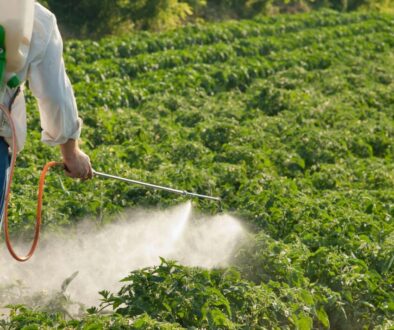MAHA report draws fire as critics say corporate pressure trumps public health
Listen to the audio version of this article (generated by AI).
By Carey Gillam and Shannon Kelleher
A long-awaited and highly controversial report issued on Tuesday by the Trump administration’s “Make America Healthy Again” (MAHA) Commission provides a few “crumbs” for public and environmental health advocates, but big wins for powerful food and chemical industries seeking to skirt limits on their products and practices.
The report, unveiled in a press event in Washington DC, is significantly more friendly to corporate interests than a prior MAHA report released in May, which called for sweeping changes to US food, health, science and regulatory systems to address rising rates of chronic disease.
In contrast, the new report speaks of already “robust” regulatory oversight from the US Environmental Protection Agency (EPA), and removes or softens language about health risks stemming from exposures to pesticides and other chemicals. It also stresses a need for deregulation in farming operations to reduce the “regulatory burden” of permitting requirements for such things as hazardous waste handling.
The Trump administration said the new report outlines its “approach to pursuing rigorous, gold-standard scientific research to guide informed decisions, promote healthy outcomes for children and families, and drive innovative solutions.”
But nutrition experts and health advocates said the report falls far short of the type of aggressive actions needed to address Americans’ poor health, and appears to be rife with corporate influence.
“The report has a lot of ideas for actions that really could improve health, but is short on specifics and weak on regulatory action,” said Marion Nestle, professor of Food, Nutrition, and Public Health, Emerita, at New York University (NYU). “Its overriding message is still ‘more research needed.’ It does not say nearly enough about what needs to be done to improve the diets of America’s children.”
The watered-down final report also indicates that Trump’s Health and Human Services Secretary Robert F. Kennedy Jr., a longtime environmental lawyer who has railed against chemical dangers and who leads the MAHA commission’s work, has been effectively neutered, at least when it comes to addressing chemical industry concerns, critics said.
George Kimbrell, legal director of the Center for Food Safety, said while there are “some crumbs around the edges,” the report is a “betrayal” of the “MAHA grassroots movement.”
Erasing pesticide concerns
In a move many critics found particularly egregious, MAHA’s final report has erased any mention of the controversial weed killer glyphosate, the world’s most widely used herbicide, which scientific studies have linked to cancer and other health problems. The May MAHA report specifically cited the risks of glyphosate as well as another commonly used weed killer called atrazine, which has been linked to birth defects.
The prior report also noted that people are exposed to these pesticides through farming, lawn care and through consumption of food carrying residues of herbicides, insecticides and fungicides.
But those and other points in the earlier report drew the ire of the agricultural industry and sparked a fierce push by industry organizations for the language to be removed. The final report makes no mention of pesticide exposure routes or risks.
The final report has also eliminated language in the prior report that specifically criticized corporate influence over research, regulators and lawmakers as factors contributing to America’s chronic health problems.
Zen Honeycutt, founder of the Moms Across America movement and a vocal MAHA supporter, said her group is “deeply disappointed that the committee allowed the chemical companies to influence the report.”
Eliminating scrutiny of glyphosate and atrazine “is not a result of new science that shows these two most widely used herbicides to be safe, but rather a tactic to appease the pesticide companies,” Honeycutt said.
“We would rather that this MAHA Commission report had put the health and safety of our children first and made a bold commitment to reduce our children’s exposure to thousands of harmful pesticides; many of which are banned in other countries, many more which have been given emergency use authorization without safety studies,” Honeycutt said. “Reducing exposure to these pesticides is crucial to making America healthy again.”
Parroting pesticide lobby
Several sections of the new report adopted policy language sought by CropLife America, the lobbying organization for companies selling agricultural chemicals, such as Bayer, Syngenta, the former Monsanto Co., BASF and others.
CropLife said the May report includes “misleading and alarmist statements about pesticides” and recommended instead that the MAHA report “reiterate the robust, respected process used by EPA to review pesticides…”
The final version of the report states that “EPA, partnering with food and agricultural stakeholders, will work to ensure that the public has awareness and confidence in EPA’s pesticide robust review procedures and how that relates to the limiting of risk for users and the general public and informs continual improvement.”
Multiple other CropLife points are adopted in the final MAHA report, including language about prioritizing research and programs to help farmers use precision agriculture technology, the Environmental Working Group noted in a press release following the report’s release.
CropLife did not respond to requests for comment.
The report also sparked anger for recommending exclusions under the National Environmental Policy Act for “low volume meat processing operations from water discharge and hazardous waste permitting.”
The report also calls for “fast-track approvals” for “regional meat infrastructure” and for ensuring flexibility for “farms to manage manure and process water without triggering industrial-grade permitting requirements and avoiding the forced mandates of costly technologies or practices…”
Offering “additional guardrails”
Several provisions within the report were cautiously welcomed by health advocates, including moves to increase nutrition research, update dietary guidelines, add a new arm of HHS called the Administration for a Healthy America, and reduce consumption of ultra-processed foods and artificial food dyes.
Also among the measures applauded by health advocates is a pledge that the Food and Drug Administration (FDA) will reform regulations related to food additives that are allowed into the food supply if they are designated “generally recognized as safe” (GRAS). Companies currently are encouraged to voluntarily submit notice of new additives to the FDA but the agency will close the “GRAS loophole,” and implement a mandatory GRAS notification program, the report states.
”We welcome the recommendations in the MAHA report that have the potential to improve the food we grow and eat, and in turn, improve our health,” US PIRG Education Fund Public Health Associate Liam Sacino said in a statement. “Closing the Generally Recognized as Safe (GRAS) loophole, and working to reduce the amount of food dyes in school lunch programs, could make eating in the United States safer.”
PIRG criticized the commission, however, for failing to set a plan to mitigate chronic exposure to toxic chemicals, including pesticides.
In another point welcomed by health advocates, the report said HHS and agencies within HHS oversight will “require more transparency, as well as additional guardrails needed to protect public health from corporate influence.”
The report also calls for the exploration of “potential” new guidelines to limit the direct marketing of junk food to children. Several studies have detailed the billions of dollars spent annually on US food advertising of sugary drinks, candies, and other unhealthy foods that specifically target children.
Jennifer Harris, senior research advisor with the Rudd Center for Food Policy & Obesity at the University of Connecticut, said she is skeptical that particular provision will make a difference.
“For the past almost 20 years various US government entities have proposed and developed voluntary guidelines for industry to improve food marketing to kids – and the food industry has promised to do better. Yet kids continue to be bombarded with marketing that almost exclusively promotes junk food, including sugary drinks, fast food, candy, salty and high-sugar snacks,” she said.
“Without government regulation, or some credible threat of regulation, I am skeptical that we will see any meaningful improvements in junk food marketing to kids,” Harris said.
Kennedy’s longtime focus on vaccine regulation and safety is also noted in the report, with a section stating that the White House and HHS will develop a framework focused on “addressing vaccine injuries,” modernizing vaccines, “correcting conflicts of interest and misaligned incentives” and “ensuring scientific and medical freedom.”
Heightened scrutiny of fluoride, which many studies have shown to pose health risks, is also called for in the MAHA report.
“Sickest country in the world”
The White House cites data showing that among more than 200 countries and territories, the US had the highest age-standardized incidence rate of cancer in 2021 and experienced an 88% increase in cancer from 1990-2021, the largest percentage increase of any country evaluated.
For children, 2022 data shows more than 40% of the country’s youth – roughly 30 million – suffered from at least one chronic health problem, with nearly 30% of adolescents prediabetic. More than 3.4 million children are medicated for attention deficit disorders, with diagnoses continuing to climb, the White House states.
“We are now the sickest country in the world,” Kennedy said in a press conference on Tuesday, citing data he said shows more than 76% of Americans are suffering from chronic disease. “We spend nearly as much in our country for health care as all the other nations in the world combined and yet we have the worst health outcomes.”
Kennedy ducked a question at the press conference asking about the changes in the report with respect to pesticides.
But US Secretary of Agriculture Brooke Rollins weighed in, touting the EPA and what she said is the necessity of pesticides in producing the “safest, most abundant, the best food in the world.”
“The EPA is arguably the most rigorous, the most data-backed, the most scientifically deep review process in the world. To approve any product that is used by our farmers, it will have gone through years upon years upon years of research,” Rollins said. “A crop protection tool such as pesticides is absolutely essential for America not to compromise our food supply system at this point.”
NYU’s Nestle said the report overall represents a wasted chance for meaningful change.
“What’s still missing is regulation. So much of this is voluntary, work with, promote, partner,” she said. “MAHA has so much bipartisan support. This is such an opportunity. I sure wish they had taken it.”
(Featured photo of MAHA Sept. 9. 2025 press conference by Shannon Kelleher.)





September 10, 2025 @ 4:21 pm
I wonder that if MAHA’s hands have been tied to limited ability to tackle the food problem at the large corporation level of politics why not give direction and reachable help to the smaller farmers to thrive rather than struggle?
I am sure it has been through a trickle down of the President being manipulated by big food corporations that MAHA had to ‘soften’ this last report.
It is obvious that hands have been tied.
…perhaps MAHA needs to be looking at protecting the Amish communities and the small farmers? Our water sources? The small ranchers?
To further educate our communities, parents and children on advertising and marketing scams.
If big corporations are using marketing, then we should too!!!
Fight fire with fire.
We won’t win in their arena of politics unless we find another route to the masses.
Shouldn’t small farmers have the same rights as large corporations?
Couldn’t we put legal aid in place to help the ones who are being shoved out of business?
Pushed around and stolen from?
Trying to fight big corporations on their turf is commendable and necessary, but is kind of a lost cause and a very slow-to-adhere process, if at all.
Isn’t that because the general public is afraid of losing jobs AND having to take responsibility for their children’s diets when it is easier to give them tech gadgets, toys, and unlimited TV? Take them to the carnival and buy them cotton candy?
Parents do not want to teach children themselves, and we have fallen into trusting the school systems so that we can go to work and pay for our own gadgets, toys, and go have a beer.
Less debt and more home time should sound better than…lets all go to work so we can buy things and food for entertainment.
What happened to home economics class that taught us how to cook, clean and sew?
Workshop to fix things?
Does recycling even exist?
Or is that extra trash can a ‘dupe’ to make us feel good about our heaps of trash from shopping?
What is wrong with the phone or car that we already own?
Does anyone realize that the new car smell is poisonous for a very long time?
We are not told that when we buy a new car, and even the most savvy person does not want to hear it.
Parents rarely care what is being taught in public schools beyond the child passing the grade. We have been programmed into blind trust so we can work to pay for things we don’t need.
Shopping for new clothes each season is seemingly essential.
Toxic from refining recycled plastic into material for cheap ‘new’ clothing.
Children are taught that authority is outside of the home, and they had better listen or the kids will tell.
Has anyone noticed that children’s TV shows almost always degrade the father into an idiot with a very limited sense of logic?
What is that doing to family dynamics?
Mothers are always working and too busy to guide children during the ‘boring’ moments of the day…in real life, moms are too tired to fight convenience.
Cooked meals become glysophate pizza, fast food, microwave magic food, boxed, bagged or canned magic. (the list is enormous).
Amazingly…small children think that fathers are supposed to clean up after them, moms are busy getting hair, clothing, and nails done…ugh.
And food shouldn’t come from animals?
Only animals eat animals?
Instead, we are taught that animals belong in sanctuaries where they are safe and fed bagged food… no one seems willing to talk about how the animals are miserably caged?
No one wants to admit that breeding animals for profit is just cruel.
We promote breeding domestic animals for profit and post them for sale.
The leftovers or unwanted can be housed in rescue facilities until adopted and live happily ever after???
That is not reality.
The reality is disgusting.
Nor is thinking that domestic animals cannot smell the death that awaits them in shelters and understand what death is…ugh..breeders should be made to volunteer in kill shelters for several days and hours just like any other business license acquired.
Breeders should be licensed, monitored, and kept to a limit.
(Sorry, that has always been a personal pet peeve of mine. Pun not intended.
So many cartoons and programs are with children doing ‘whatever’ on their own at very young ages, dressed all sparkly with magical wins and losses fixed by a community of friends.
This is not reality.
We are often left to solve our own losses by ourselves or on a bar stool… and that is often a failure.
Parents only periodically pop in to do normal daily tasks like bringing in the groceries or vacuuming.
Good, helpful, and/or truthful cartoons or TV shows are often considered ‘creepy’ or ‘boring’ by children, and that is unsettling.
I realize I have gone off topic…my apologies.
It is sad how many homes are filthy because no one wants to get their hands wet, and certainly woman cannot put their manicured nails in water…oh my goodness.
Children are growing up believing that cleanliness is done by someone else or is simply overrated.
Do we know how to remove stains without a chemical spray?
Or recycle the clothing once unwearable?
(again… off topic:().
Years ago, I said that ADHD is a blanket term.
Probably still true for many ailments, adult and child-related.
Used by doctors to soothe the feelings of overworked, lazy or those in denial because if a doctor suggests that soda pop, sugary foods and chemical-laden foods might be the cause of hyperactivity, the inability to focus or the cause of a general health issue…
well the doctors would lose patients and probably be kicked out of the medical field altogether if they happened to be successful in convincing a patient to take control of their situation without continued use of drugs.
This remains a problem.
Few people want to hear that if the child or adult stopped eating and drinking tons of sugar or pasta they might create better health and behave better as a whole.
So then, wouldn’t it be more effective to educate parents and doctors about nutrition alternatives?
This might be an easier task than curtailing the mass production of chemical, herbicide, and pesticide-laden foods by corporations that own the politicians.
And really, what are the alternatives?
There are not very many, are there?
No, there isn’t.
Nothing on the grocery aisles is safe to eat…nothing.
Pesticides float from sprayed fields to every home and backyard garden and into our water…
And now the crap is in our air from industrial waste being dispensed into the air and labeled ‘weather control conspiracy’.
No one sees that yet, but wait for it…eventually, someone will let the cat out of the bag.
Industrial waste cannot be sent out to sea or buried in barrels so easily anymore…so then, where does it go? They are releasing it into the air and hoping everyone continues to call it weather control and maybe it is, aren’t scientists smart enough to use the waste to spray it where they want and know what they are releasing? I would say they are paid well to learn how.
That is another topic, but a win-win for the industrial owners.
Basic logic.
Bottom line…it is rare to find anything worth feeding to a child today.
Forget about the expense.
Unsaturated ingredients just aren’t available anymore.
Big corporations don’t want us to learn how to eat, sleep, clothe ourselves, heat or stay cool, travel, clean, or be healthy without paying them.
We don’t want to know that something labeled organic isn’t truthfully organic, and most people do not know that this food also needs to be washed.
Few people know that the words organic or heart-healthy are nothing but label marketing sales tactics and are not regulated to include the big conglomerates, as the rules don’t apply to big corporations.
Few people know or realize that the safest food has both the non-GMO and organic stamps on a label or that a small home garden really is not that hard to maintain.
Oddly, few people know how to compost the unused or end-of-season garden waste, or that compost does not stink or attract wildlife and bad insects unless meat and dairy are added to it…they don’t know not to put meat scraps or dairy in compost.
Few realize that a bottle of cinnamon sticks is often not even cinnamon.
Few want to admit or learn that our ground and water are saturated in chemicals, herbicides, and pesticides.
Few want to admit that the new car smell is poison.
Few want to admit that the stuff being sprayed over field after field of…corn and soybeans?…is lethal.
The corn they are eating is field corn, not meant for human consumption, but must be refined and processed in a way that makes it seem like healthy corn products.
People don’t know because it is inconvenient.
Kind of like dog food…is it really food fit for a dog? Most of it isn’t.
We need to educate parents so that children can learn the truth.
It’s kind of like the D.A.R.E. or MADD programs.
Advertise, advertise, advertise!!
Show us we can help the small farmer and the backyard gardener stay afloat and keep our freedom to buy from the folks who are willing to take on the job and do it well.
Somewhere, we got lost, and we need to find a way to go around the fools on the hill.
Bobby and his crew have no chance in fighting the big corporations, but they are appreciated for keeping vigilance.
We will be lucky and blessed if he and his staff survive our mission to help not only America but also the world as a whole.
Remember, we still lead in marketing media tactics.
Both good and bad.
Let’s play the game and magnify the good marketing.
Perhaps through cartoons…people understand cartoons.